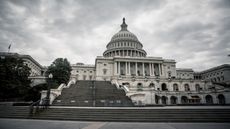Congress is Busy. And Dysfunctional.
With important must-pass legislation up against intraparty fighting, the question is whether dysfunction or democracy will win.


With little bipartisan agreement in Congress, it's hard to know what legislation, if any, stands a chance at passage. To help you understand what is going on and what we expect to happen in the future, our highly experienced Kiplinger Letter team will keep you abreast of the latest developments and forecasts (Get a free issue of The Kiplinger Letter or subscribe). You'll get all the latest news first by subscribing, but we will publish many (but not all) of the forecasts a few days afterward online. Here’s the latest…
Congress can be summed up in two words: Busy, with some important must-pass items dominating an already crowded legislative calendar. And dysfunctional, as intraparty fighting escalates, particularly among House Republicans. The question is whether dysfunction will win.
Lawmakers must first fund the government. Several agencies will shut down on March 1. The rest will run out of money on March 8, unless Congress takes action. Lawmakers have already resorted to three temporary spending bills since the start of the 2024 fiscal year, which began on October 1. Expect Congress to avert a government shutdown, but not easily. They have little time left, and many members of both the House and Senate will be out of town on recess until later this month. That makes another stopgap funding bill more likely. Most lawmakers are eager to avoid a shutdown in an election year however, the political dynamics make even such a popular move a difficult prospect.

Sign up for Kiplinger’s Free E-Newsletters
Profit and prosper with the best of expert advice on investing, taxes, retirement, personal finance and more - straight to your e-mail.
Profit and prosper with the best of expert advice - straight to your e-mail.
Keep an eye on Rep. Mike Johnson (R-LA), the speaker of the House, for now. Johnson has struggled to restore House Republican unity since taking the job last year, a difficulty compounded by the party’s razor-thin, two-vote cushion in the chamber. The speaker has frequently kept even top lieutenants in the dark about big decisions, and we may not know what course of action he’ll take until the last possible moment. Look for Johnson to do what he can to keep the GOP rank and file happy, as evidenced by the House’s recent impeachment of Alejandro Mayorkas, secretary of Homeland Security. The Senate is unlikely to convict Mayorkas and remove him from office, but the move won favor from many hard-line House Republicans.
The speaker will stonewall most major legislation now under consideration. This includes a bipartisan bill to provide military aid to Ukraine and Israel, which appears to be dead — with or without a Senate deal to boost border security — though Johnson could still surprise us. Any stand-alone border bill will certainly fail.
Also in limbo: A reauthorization and reform of federal surveillance powers under Section 702 of the Foreign Intelligence Surveillance Act. This authority, which will expire in April without congressional action, allows Uncle Sam to spy on foreign nationals in certain circumstances. Critics complain that communications of U.S. citizens are often swept up in the process. A compromise appears unlikely.
As these issues consume Capitol Hill, meanwhile, a host of lower profile, bipartisan proposals sit indefinitely on the back burner. These include an effort to refund the Affordable Connectivity Program, a COVID-era initiative that provides wireless internet for low-income households. And a bipartisan railway safety bill inspired by last year’s Norfolk Southern train derailment in Ohio. One bill that may break through the logjam: A bipartisan tax package, that would revive several business tax credits and expand the child tax credit. But lawmakers will stop legislating by late spring to focus on campaigning.
This first appeared in The Kiplinger Letter, which has been running since 1923 and is a collection of concise weekly forecasts on business and economic trends, as well as what to expect from Washington, to help you understand what’s coming up to make the most of your investments and your money. Subscribe to The Kiplinger Letter.
Related Content
- Another Government Shutdown Threat Looms As Lawmakers Break For Recess
- Current Challenges Highlight U.S. Foreign Policy Weakness: The Kiplinger Letter
- Republicans vs Republicans, the Widening Division: The Kiplinger Letter
- After Weeks Without a Speaker, Congress Finally Returns to Legislating: The Kiplinger Letter
- Democrats and Republicans Sidestep Tensions In Their Parties: The Kiplinger Letter

Sean Lengell covers Congress and government policy for The Kiplinger Letter. Before joining Kiplinger in January 2017 he served as a congressional reporter for eight years with the Washington Examiner and the Washington Times. He previously covered local news for the Tampa (Fla.) Tribune. A native of northern Illinois who spent much of his youth in St. Petersburg, Fla., he holds a bachelor's degree in English from Marquette University.
-
 Nine of the Biggest Regrets I See as a Financial Planner
Nine of the Biggest Regrets I See as a Financial PlannerCheck out this list of common regrets among older people and see if there’s something you can address in your own life while there’s still time.
By Andrew Rosen, CFP®, CEP Published
-
 Three Habits of My Most Successful Wealth Management Clients
Three Habits of My Most Successful Wealth Management ClientsClients are more likely to meet their financial objectives if they’re totally honest, take action in a timely manner and are actively engaged.
By Adam Lampe Published
-
 H-1B Work Visa Rules Get a Revamp
H-1B Work Visa Rules Get a RevampThe Kiplinger Letter H-1B visas allow employers to hire high-skilled foreign workers. Regulators have finalized new rules for this visa program following last fall's proposal.
By Matthew Housiaux Published
-
 Current Challenges Highlight U.S. Foreign Policy Weakness: The Kiplinger Letter
Current Challenges Highlight U.S. Foreign Policy Weakness: The Kiplinger LetterThe Kiplinger Letter America’s military is overextended but the U.S. remains the country of first resort when major problems crop up.
By Matthew Housiaux Published
-
 The 2024 Race for President Looks Like a Rematch: The Kiplinger Letter
The 2024 Race for President Looks Like a Rematch: The Kiplinger LetterThe Kiplinger Letter Nine months away from Election Day 2024, the presidential field has narrowed and a 2020 rematch is almost certain.
By Matthew Housiaux Published
-
 As Foreign Policy Battles Ramp Up, is the U.S. Defense Industry Ready?
As Foreign Policy Battles Ramp Up, is the U.S. Defense Industry Ready?The Kiplinger Letter As the threat landscape heats up, this special issue of the Kiplinger Letter reviews the challenges facing the defense industry.
By Matthew Housiaux Published
-
 10 Predictions for 2024 from The Kiplinger Letter
10 Predictions for 2024 from The Kiplinger LetterThe Kiplinger Letter As 2023 wraps up, here are 10 big predictions for the new year.
By Letter Editors Published
-
 Biden Has One Last Obamacare Policy To Roll Out: The Kiplinger Letter
Biden Has One Last Obamacare Policy To Roll Out: The Kiplinger LetterThe Kiplinger letter This final Obamacare policy would require states to synchronize open enrollment if they operate their own Obamacare exchanges.
By Matthew Housiaux Published
-
 Senate Control Will Likely Come Down to Just Two States: The Kiplinger Letter
Senate Control Will Likely Come Down to Just Two States: The Kiplinger LetterThe Kiplinger Letter Montana and Ohio may hold the key to control in the Senate as the Democrats angle for control.
By Sean Lengell Published
-
 The GOP Field of Presidential Candidates Is Shrinking Fast: The Kiplinger Letter
The GOP Field of Presidential Candidates Is Shrinking Fast: The Kiplinger LetterThe Kiplinger Letter Only five GOP candidates remain in the fight for the White House, as those struggling in the polls put their campaigns on hold.
By Matthew Housiaux Published









